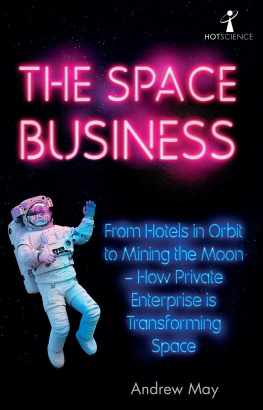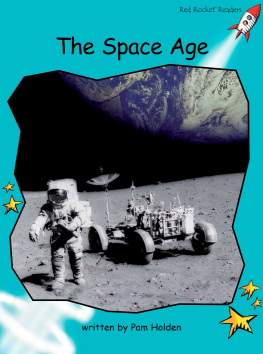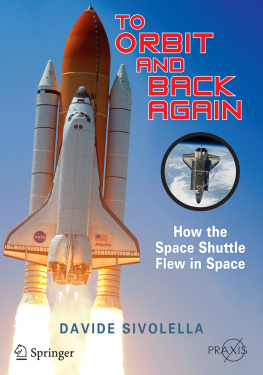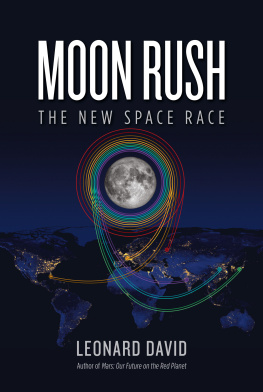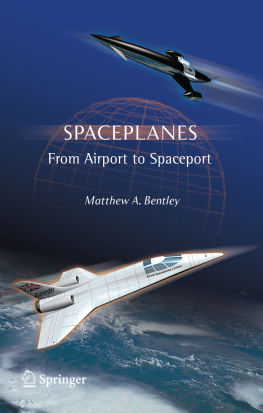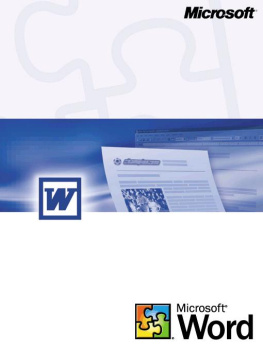Andrew James May - The space business : from hotels in orbit to mining the moon : how private enterprise is transforming space
Here you can read online Andrew James May - The space business : from hotels in orbit to mining the moon : how private enterprise is transforming space full text of the book (entire story) in english for free. Download pdf and epub, get meaning, cover and reviews about this ebook. year: 2021, genre: Religion. Description of the work, (preface) as well as reviews are available. Best literature library LitArk.com created for fans of good reading and offers a wide selection of genres:
Romance novel
Science fiction
Adventure
Detective
Science
History
Home and family
Prose
Art
Politics
Computer
Non-fiction
Religion
Business
Children
Humor
Choose a favorite category and find really read worthwhile books. Enjoy immersion in the world of imagination, feel the emotions of the characters or learn something new for yourself, make an fascinating discovery.
- Book:The space business : from hotels in orbit to mining the moon : how private enterprise is transforming space
- Author:
- Genre:
- Year:2021
- Rating:3 / 5
- Favourites:Add to favourites
- Your mark:
- 60
- 1
- 2
- 3
- 4
- 5
The space business : from hotels in orbit to mining the moon : how private enterprise is transforming space: summary, description and annotation
We offer to read an annotation, description, summary or preface (depends on what the author of the book "The space business : from hotels in orbit to mining the moon : how private enterprise is transforming space" wrote himself). If you haven't found the necessary information about the book — write in the comments, we will try to find it.
Andrew James May: author's other books
Who wrote The space business : from hotels in orbit to mining the moon : how private enterprise is transforming space? Find out the surname, the name of the author of the book and a list of all author's works by series.
The space business : from hotels in orbit to mining the moon : how private enterprise is transforming space — read online for free the complete book (whole text) full work
Below is the text of the book, divided by pages. System saving the place of the last page read, allows you to conveniently read the book "The space business : from hotels in orbit to mining the moon : how private enterprise is transforming space" online for free, without having to search again every time where you left off. Put a bookmark, and you can go to the page where you finished reading at any time.
Font size:
Interval:
Bookmark:
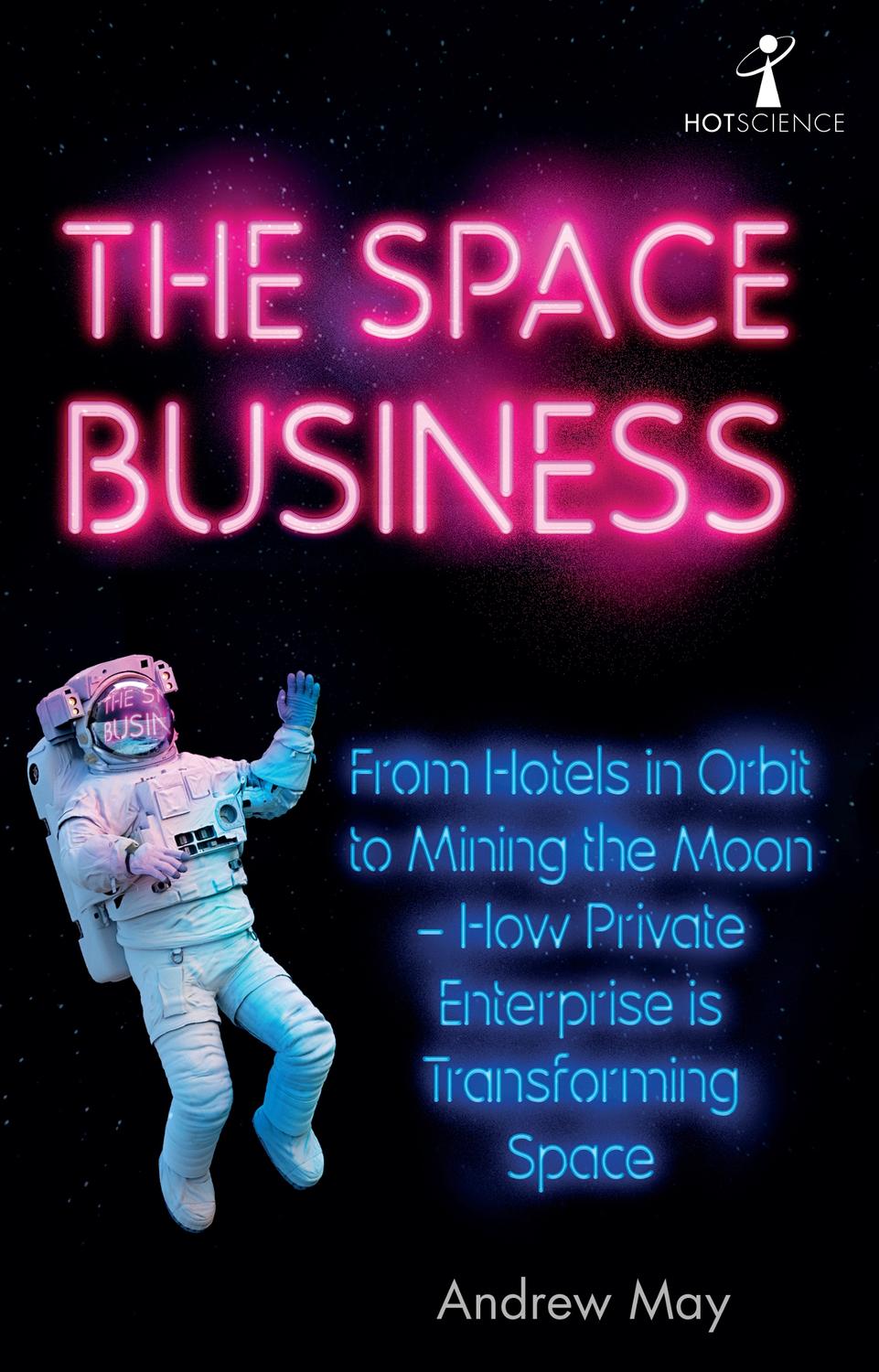
i
Hot Science is a series exploring the cutting edge of science and technology. With topics from big data to rewilding, dark matter to gene editing, these are books for popular science readers who like to go that little bit deeper
Destination Mars:
The Story of Our Quest to Conquer the Red Planet
Big Data:
How the Information Revolution is Transforming Our Lives
Gravitational Waves:
How Einsteins Spacetime Ripples Reveal the Secrets of the Universe
The Graphene Revolution:
The Weird Science of the Ultrathin
CERN and the Higgs Boson:
The Global Quest for the Building Blocks of Reality
Cosmic Impact:
Understanding the Threat to Earth from Asteroids and Comets
Artificial Intelligence:
Modern Magic or Dangerous Future?
Astrobiology:
The Search for Life Elsewhere in the Universe ii
Dark Matter & Dark Energy:
The Hidden 95% of the Universe
Outbreaks & Epidemics:
Battling Infection From Measles to Coronavirus
Rewilding:
The Radical New Science of Ecological Recovery
Hacking the Code of Life:
How Gene Editing Will Rewrite Our Futures
Origins of the Universe:
The Cosmic Microwave Background and the Search for Quantum Gravity
Behavioural Economics:
Psychology, Neuroscience, and the Human Side of Economics
Quantum Computing:
The Transformative Technology of the Qubit Revolution
The Space Business:
From Hotels in Orbit to Mining the Moon
How Private Enterprise is Transforming Space
Game Theory:
Understanding the Mathematics of Life
Hot Science series editor: Brian Clegg
Imagine saving up for the trip of a lifetime to Sky Hotel, orbiting 16,000 kilometres above the surface of the Earth. There, you can indulge in a choice of activities, from familiar ones like cordon bleu dining or gambling in the casino, to the very far from usual, such as zero-gravity sports. Or how about swimming round and round on the inside of a rotating cylinder, where the water is held in place by centrifugal force? Then there are the views of Earth which you can see in its stunning entirety, from pole to pole, or magnified through a telescope so you can see individual buildings in any city you choose to focus on.
Thats the scenario that Arthur C. Clarke described in his article Vacation in Vacuum, published in Holiday magazine way back in 1953. Best known as a science fiction author, Clarke was also a scientist and visionary who was among the first to grasp the real-world possibilities of space travel. In 1945 he famously championed the idea of geosynchronous communication satellites, two decades before they became a reality. His key realisation was that space isnt just interesting, its useful. When the space race turned its attention to the Moon in the 1960s, most people saw it as a purely political goal or at best an exercise in pure science. Clarke was one of the few who could see further than that. In his 1966 book Voices from the Sky, he wrote of the Moon that:
A century from now it may be an asset more valuable than the wheatfields of Kansas or the oil wells of Oklahoma an asset in terms of actual hard cash, not the vast imponderables of adventure, romance, artistic inspiration and scientific knowledge.
The idea of making money from travelling to the Moon rather than sinking billions of dollars into simply planting a flag on its surface was a novelty, and one that few people outside the world of science fiction took seriously. Yet the basic concept was as sound then as it is now. Take lunar tourism, for example the basis of Clarkes novel A Fall of Moondust (1961). If people are going to splurge out for a vacation in Earth orbit, theyll splurge even more for one on what is effectively a whole different world.
There are other types of space business that dont depend on milking super-rich customers. They just make hard-nosed economic sense, or they will do once theyre established. Thats true, for example, of another of the topics discussed by Clarke, lunar mining. As well see later, there are valuable elements that are far easier to extract on the Moon than here on Earth. The same is true maybe even more so of near-Earth asteroids. A staple of science fiction since the early 20th century, asteroid mining has the potential to be one of the most lucrative undertakings beyond the Earths atmosphere.
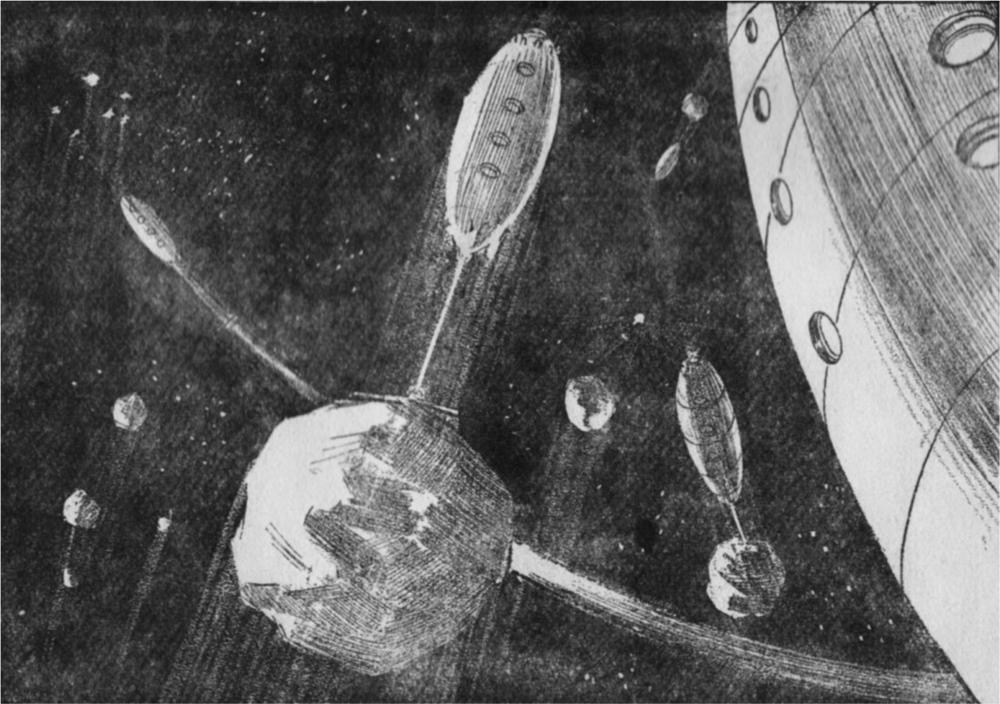
A vision of asteroid mining from the December 1935 issue of Amazing Stories.
(Public domain image)
Sixty years after the first humans were launched into orbit, we still havent quite achieved Arthur C. Clarkes vision of a thriving, self-sustaining space business but were getting there. Although communication satellites have been around since the 1960s, its only in recent years that theyve been built, launched and operated entirely by private companies and in a big way, too. Just think of Elon Musks SpaceX and its vast constellation of Starlink satellites, which aim to bring broadband internet to remote locations all over the world.
Similarly, were now seeing the birth of the first privately operated space tourism companies, such as Richard Bransons Virgin Galactic and Jeff Bezoss Blue Origin, with their modest offering of brief suborbital hops. Far more ambitious plans including orbiting hotels and trips around the Moon are in advanced stages of preparation. Other companies are working on the technology needed to extract minerals from asteroids, or to operate robotic mining equipment on the Moon.
All these topics space tourism, private satellite constellations, asteroid mining and more will be discussed in detail in the chapters to come. First, however, we need to address one very obvious question. Why is the space business taking so long to get up and running?
You may have heard the phrase space is hard, because its become something of a clich. Richard Branson said it in the wake of the fatal crash of Virgin Galactics SpaceShipTwo spaceplane during a test flight in October 2014. The following June, the phrase was used by astronaut Scott Kelly on board the International Space Station (ISS), after a SpaceX cargo craft was destroyed en route to the station. And Peter Diamandis, the founder of the Lunar X Prize for the first private company to put a robotic lander on the Moon, said the same thing when the most promising contender, Israels Beresheet, crashed onto the lunar surface in April 2019.
The fact that the phrase gets used so often, and under circumstances like these, more or less proves that its true. Space really is hard, for a variety of reasons. It involves highly complex and often new and untested technology, hence the frequent mishaps and accidents. Its an immensely expensive business, particularly in the developmental stages, so even wealthy companies can struggle to get the necessary funding together. Hardest of all, it involves doing things that evolution just hasnt prepared humans for, such as ascending for hundreds of kilometres against the pull of Earths gravity, or surviving in the vacuum of outer space.
Up to a certain point, theres no fundamental physics preventing us reaching higher and higher altitudes. Both helium balloons and jet aircraft, if theyre specially designed for the task, can climb to 30 kilometres or a little beyond that. But thats when the problems start, because the higher you get, the less atmosphere there is to support you. At 40 km the air density is only a 300th of its value at sea level, and at twice that height it is 200 times smaller still.
Font size:
Interval:
Bookmark:
Similar books «The space business : from hotels in orbit to mining the moon : how private enterprise is transforming space»
Look at similar books to The space business : from hotels in orbit to mining the moon : how private enterprise is transforming space. We have selected literature similar in name and meaning in the hope of providing readers with more options to find new, interesting, not yet read works.
Discussion, reviews of the book The space business : from hotels in orbit to mining the moon : how private enterprise is transforming space and just readers' own opinions. Leave your comments, write what you think about the work, its meaning or the main characters. Specify what exactly you liked and what you didn't like, and why you think so.

